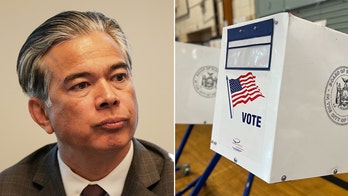WASHINGTON – The White House said Wednesday that there's enough "substance" in a bipartisan Senate plan to craft legislation that would cut the deficit and raise the debt cap, despite lingering doubts in Congress about whether there's enough time or consensus to move forward on it.
Trying to keep talks alive, President Obama has summoned top Democratic leaders from the House and Senate to the White House Wednesday afternoon; he plans to meet afterward with the top two House Republicans. The meetings come as the "Gang of Six" Senate plan has, in a span of 24 hours, emerged as the leading proposal to lift lawmakers out of their debt-ceiling quagmire.
White House Press Secretary Jay Carney, without commenting on specific provisions, said the president supports the approach the senators have taken. Aides report that 30 senators already have signed on to the blueprint.
But the plan would only amount to a new starting point, as Obama said Tuesday a "broader agreement" would be needed to pass something out of both chambers. And members of both parties made clear Wednesday that they weren't yet sold on the idea put forth by the "Gang of Six" to curb spending.
Some Republicans claimed to be holding out hope for the plan they passed out of the House Tuesday evening to cut and cap federal spending and push a balanced-budget amendment in exchange for a debt-ceiling increase -- though Democrats are vowing to kill that bill in the Senate.
"In case Senator Reid didn't notice, a bipartisan 'Gang of 234' just sent him the way forward," Rep. Jim Jordan, R-Ohio, chairman of the Republican Study Committee, said in reference to the House bill vote. "This is the only plan that can fundamentally solve our debt problem."
Republicans quickly pointed out their concerns with a component of the Senate plan that calls for about $1 trillion in additional revenue over 10 years. While saying the proposal contains some "constructive ideas," House Republican Leader Eric Cantor said he's worried about that "revenue target" and how it would be reached.
"I continue to caution that a tax increase is the wrong policy to pursue with so many Americans out of work," he said in a statement.
His office said in its daily email Wednesday that the plan also "does not significantly address" entitlement programs.
Others expressed frustration that yet another "gang" of select lawmakers was assuming the lead role in navigating a legislative problem.
"We are an anti-gang group. We are trying to suppress the growth of gangs," Rep. Emanuel Cleaver, D-Mo., said Wednesday.
Cantor and House Minority Leader Nancy Pelosi both pointed out the more practical concern that the plan is still too fuzzy to gauge.
"How can (Pelosi) ask anyone to do anything if the bill is not ready?" Pelosi spokesman Nadeam Elshami said in a statement, summing up the California Democrat's stance on the bill for the moment. Pelosi, like Cantor, said the plan contains "good principles."
The proposal is likely too complex for bill-writers to be able to put all the language to paper in time to have it voted on by Aug. 2 -- the date by which the administration says Congress must raise the debt ceiling or face a potential fiscal crisis.
Rather, some lawmakers are looking to build off the plan, which aims for $3.7 trillion in deficit reduction over the next decade, in striking a deal that can be written and approved by early August.
Going in their favor is the fact that some Senate Republicans and Democrats are working together on the concept, giving and taking in a way that is not happening on the House side.
In the other chamber, House Republicans on Tuesday approved a plan to cut and cap federal spending and require Congress to approve a balanced-budget amendment in order to clear a debt-ceiling increase. Democrats loathe that plan and say it will die in the Senate.
While some outside the "gang" are hesitant to embrace the Senate blueprint, the authors are trying to win over their colleagues.
Sen. Kent Conrad, D-N.D., the Senate Budget Committee chairman, claimed the plan would "actually reduce tax rates" once all the changes are made. Though the plan would seek to raise revenue, Conrad said it would do so by broadening the tax base and reducing exemptions and credits.
Carney also said Wednesday that while the president opposes a short-term extension of the debt ceiling, he might make an "exception" if a long-term deal is reached and lawmakers need a "very short-term extension" of a few days to allow time for the bill to work its way through the formal legislative process.




